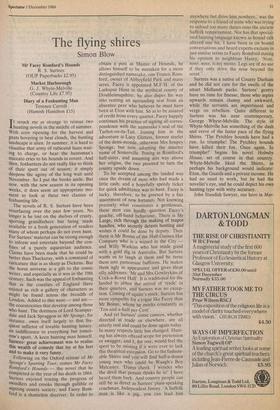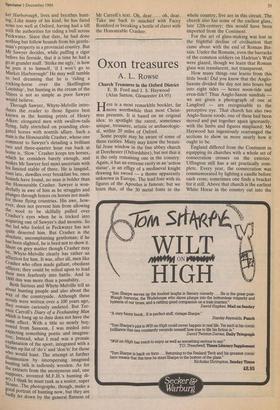The flying shires
Simon Blow
Mr Facey Romford's Hounds R. S. Surtees (OUP Paperbacks £2.95) Market Harborough G. J. Whyte-Melville (Country Life £7.95) Diary of a Foxhunting Man Terence Carroll (Hamish Hamilton £15)
It struck me as strange to reissue two hunting novels in the middle of summer. With corn ripening for the harvest and gnats hovering in heat clouds, the hunting landscape is alien. In summer, it is hard to visualise that army of rubicund faces wait- ing to charge, or hear the huntsman's staccato cries to his hounds in covert. And then, foxhunters do not really like to think of their sport out of season; it simply deepens the agony of the long wait until November. So I put the books aside. But now, with the new season in its opening weeks, it does seem an appropriate mo- ment to look at these two classics of foxhunting life.
The novels of R. S. Surtees have been resurfacing over the past few years. No longer is he lost on the shelves of crusty, sporting grandfathers but being made available to a fresh generation of readers many of whom perhaps do not even hunt. For Surtees' material can be strong enough to inform and entertain beyond the con- fines of a purely equestrian audience. Claims have been made that he could be better than Thackeray, with a command of caricature that is as sharp as Dickens. But the horse universe is a gift to the comic writer, and especially as it was in the 19th century. Such was the appeal of foxhunting that in the counties of England there existed as rich a gallery of characters as might be found across the breadth of London. Added to this were — and are the eccentricities that develop among those who hunt. The dottiness of Lord Scamper- dale and Jack Spraggon in Mr Sponge, for instance, owes itself largely to that fre- quent inflictor of lovable hunting lunacy: an indifference to everything but tomor- row's sport. A keen hunting man himself, Surtees, great achievement was to realise this wealth of comedy that lay at his feet and to make it very funny. Following on the Oxford reissue of Mr Sponge's Sporting Tour, comes Mr Facey Romford's Hounds -- the novel that he completed in the year of his death in 1864. Surtees enjoyed tracing the progress of swindlers and crooks through gullible or aspiring county society, and Facey Rom- ford is a shameless deceiver. In order to
obtain a post as Master of Hounds, he allows himself to be mistaken for a more distinguished namesake, one Francis Rom- ford, owner of Abbeyfield Park and many acres. Facey is appointed M.F.H. of the Larkspur Hunt in the mythical county of Doubleimupshire; he also dupes his way into renting an upstanding seat from an absentee peer who believes he must have been at Eton with him. So as to be assured of credit from every quarter, Facey happily continues his practice of signing all corres- pondence with the namesake's seal of the Turbot-on-its-Tail. Joining him in the adventure is Lucy Glitters, former starlet of the demi-monde, otherwise Mrs Soapey Sponge, but now adopting the smarter name of Somerville. Posing as Romford's half-sister, and assuming airs way above her origins, the two proceed to turn the county upside down.
To be accepted among the landed was once the dream of most who had made a little cash; and a hopefully spdedy ticket for quick admittance was to hunt. Facey is lucky, therefore, to be greeted by a fair assortment of new fortunes. Not knowing precisely what constitutes a gentleman, these men can hardly question Facey's gauche, off-hand behaviour. There is Mr Large, rich through the making of teapot handles, who secretly detests hunting and wishes it could be done by deputy. Then there is Mr Bonus of the Half-Guinea Hat Company who is a wizard in the City and Willy Watkins who has made good with a gold dig in Australia. But Surtees wants us to laugh at them and he turns them into pantomine buffoons. He makes them ugly in appearance and gives theM silly addresses: `Mr and Mrs Gowleykins of Cock-a-Roost Hall'. It is traditional for the landed to abhor the arrival of 'trade' in their quarters, and Surtees was no excep- tion. Coming of squire's stock, Surtees has more sympathy for a rogue like Facey than Mr Bonus, whom he mocks constantly as, 'Ten-and-a-half-per-Cent'. And yet Surtees' comic cameos, whether directed at trade or elsewhere, are all utterly real and could be done again today. In many respects little has changed. Hunt- ing has always offered scope for pretension or swagger, and I, for one, would feel the sport to be missing if it were ever to lack this theatrical extension. Go to the fashion- able Shires and you will find half-a-dozen young men who could be Waugh's Boy Mulcaster. 'Damn cheek. I wonder who the devil that person thinks he is!' I have heard them bark. And country people can still be as direct as Surtees' plain-speaking coachman, Independent Jimmy. 'A Suffolk man is like a pig, you can lead him
anywhere but drive him nowhere,' was the response to a friend of mine who was trying- to unload too many duties onto the ancient Suffolk temperament. Nor has that special- ised hunting language known as hound talk altered one-bit. I have been in on hound conversations and heard experts exclaim in just similar terms to Facey Romford stating his opinion to neighbour Hazey, 'Nose, nose, nose, is my motto. Legs are of no use if they only drive the nose beyond the scent.'
Surtees was a native of County Durham and he did not care for the swells of the smart Midlands packs. Surtees' gentry have no time for finesse; those who aspire upwards remain clumsy and awkward, while the servants are impertinent and verge on rebellion. Quite different to Surtees was his near contemporary, George Whyte-Melville. The style of Whyte-Melville has something of the dash and verve of the faster pace of the flying Shires. 'The Pytchley hounds have had a run. to triumphe! The Pytchley hounds have killed their fox. Once again, Io triumphe!' begins his novel Holmby House, set of course in that country. Whyte-Melville liked the Shires, as perhaps his background would indicate: Eton, the Guards and a private income. He had no need to work, but he had the novelist's eye, and he could depict his own hunting type with witty accuracy.
John Standish Sawyer, our hero in Mar-
ket Harborough, lives and breathes hunt- ing. Like many of his kind, he has fared none too well at Oxford, having had a tiff with the authorities for riding a bull across Peckwater. Since that date, he had done nothing but follow hounds from his gentle- man's property in a provincial country. But Mr Sawyer decides, while puffing a cigar before his fireside, that it is time he had a go at grander stuff. 'Strike me ugly,' is how he puts it to himself, 'if I won't go to Market Harborough!' He may well tumble to bed dreaming that he is 'riding a rocking-horse over the Skeffington Lordship', but hunting in the cream of the Shires is not so simple as poor Sawyer would believe.
Through Sawyer, Whyte-Melville intro- duces the reader to those figures best known in the hunting prints of Henry Alken: elongated men with swallow-tails flying, fully stretched on pounding elon- gated horses with nostrils aflare. Such a man is the Honourable Crasher, whose one comment to Sawyer's detailing a brilliant two and three-quarter hour run back at home is, 'Slow.' Crasher keeps ten horses, which he considers barely enough, and makes Mr Sawyer feel most uncertain with his limited stable of three. He is languid, rises late, dawdles over breakfast bu, once hounds have found, no man is bolder than the Honourable Crasher. Sawyer is won- derfully in awe of him as he struggles and Plunges through fences on horses not made for those flying countries. His awe, how- ever, does not prevent him from allowing the wool to be skilfully pulled over Crasher's eyes when he is tricked into acquiring one of Sawyer's dud mounts. So the lad who fooled in Peckwater has not quite deserted him. But Crasher is the absolute, uncomplaining gentleman; if he has been slighted, he is bred not to show it. Short on grey matter though Crasher may be Whyte-Melville clearly has rather an affection for him. It was, after all, men like Crasher who often made gallant, obedient officers; they could be relied upon to lead their men fearlessly into battle. And in 1860 this was more than a possibility. Both Surtees and Whyte-Melville tell us about hunting people and also about the Way of the countryside. Although these novels were written over a 100 years ago, they remain curiously undated. But Ter- ence Carroll's Diary of a Foxhunting Man which is bang up to date does not have the same effect. With a title so nearly bor- rowed from Sassoon, I was misled into expecting something poetic and imagina- tive. Instead, what I read was a prosaic blown-up of the sport, integrated with a °Iown-up list of 'do's' and 'don'ts' for those 1/4',110 would hunt. The attempt at further !Ilumination by interspersing imagined hunting talk is tediously wooden. As for the extracts from the anonymous and, one supposes, invented M.F.H.'s hunting di- ary, I think he must rank as a senior, super Sloane. The photographs, though, make a good portrait of hunting now, but they are badly let down by the general flatness of
Mr Carroll's text. Oh, dear . . . oh, dear. Take me back to mischief with Facey Romford or breaking a bottle of claret with the Honourable Crasher.























































 Previous page
Previous page